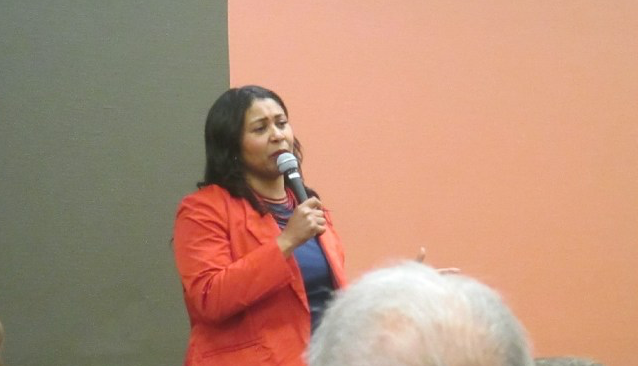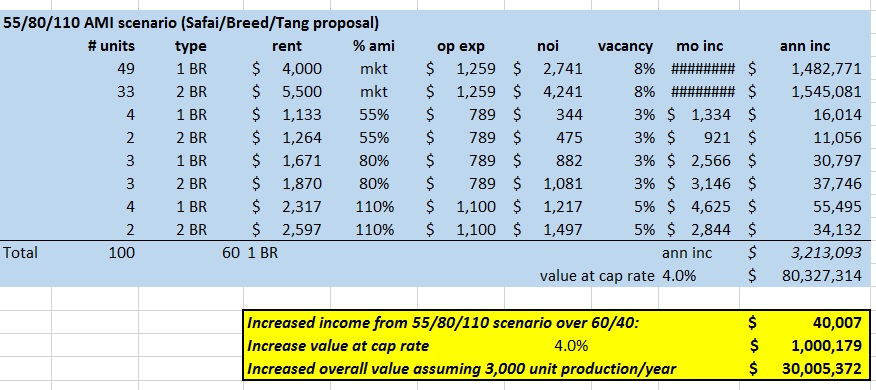
Developers in San Francisco could stand to pick up an additional $60 million in profits under an affordable housing proposal by Sups. London Breed and Ahsha Safai, a new analysis shows.
The analysis by the Council of Community Housing Organizations looks at how the proposal would pencil out for the companies that build market-rate housing in the city.
It’s a critical piece of the policy debate: Safai and Breed are calling for more “middle-class” housing, which would allow developers to meet their requirements for affordable housing by renting out or selling units for a higher price.
Creating middle-class housing is a fine idea – but in the process, their plan would take away housing for lower-income people. It would also be a big benefit to developers.
The concept is pretty simple: If you tell a developer with a 100-unit building that they have to subsidize 25 units for people who can only pay $1,000 a month, and the rest of the units rent for $5,000, the developer pays $4,000 a month. If you allow that apartment to be rented to someone who can pay $3,000, the developer pays half as much.
So if a developer can pay more, why ask them to pay less? If we are going to allow lower subsidies, why not require more subsidized units?
Instead, Breed and Safai go the other way.
The CCHO analysis looks at a hypothetical building with 100 units and analyzes what the developer would pay under the existing rules and under the changes that Breed and Safai are seeking.

If the developer had to build 18 units of affordable housing for people who make between 55 and 100 percent of the Area Median Income, the total monthly income (given current market-rate rents) would be about $3.173 million. At a 4 percent capitalization rate, that would make the building worth $79.3 million.
Allow the developer to count income levels of as high as 110 percent of AMI as “affordable” and the annual income becomes $3.213 million. That’s an extra $40,000 a year, which increases the value of the building to $80.3 million, or about a million bucks.

Multiply that by the 3,000 units a year that the city wants to build, and you’re looking at $30 million more in profits for developers.
That’s rental housing. A lot of the new projects are condos, and the affordable housing rules require that some be sold below market rate.
From CCHO:
The difference in incomes served is even more stark for condominium projects. The Controller analyzed condo projects using the current Prop C income levels, which average 96% AMI, while the Safai/Breed/Proposal serves an average income of 120% AMI. Using MOHCD’s assumptions and a 60/40 bedroom mix, an average unit at 96% AMI would be priced at about $330,000, while an average unit at 120% AMI would be priced at $434,000. For a typical 100-unit condo project with 20% inclusionary, the added value to a developer would be over $2 million in profit.
Add it all up, and depending how much of the new housing is condos, developers could walk away with as much as $60 million in additional profit.
That builds a lot more affordable housing.
The city controller did a detailed study looking at how high we can set the affordability rates without scaring developers (and investors) away from building anything. I personally think the controller was way too conservative – developers always claim they can’t afford city fees and amenities, and they always manage to build anyway, and I don’t know any big developers or real-estate investment groups that are missing any meals from the San Francisco market.
But let’s take the controller’s estimate for what it is. Under the Safai-Breed bill, the developers could “afford” to spend an additional $60 million on middle-class or low-income housing. We want middle-class housing? Fine. Increase the requirement. Instead of asking for 25 percent affordable housing, if some of that is going to be priced for households that can pay closer to market rate – and thus the developer is giving up less – ask for 35 percent. According to the controller, it still pencils out.
The point is that the Safai-Breed measure, which comes before the Planning Commission Thursday, is a developer giveaway. That doesn’t mean housing for the middle class is bad, or that the city shouldn’t put that kind of housing in the mix. But it means that the levels the two supervisors are talking about are far too low, and give the developers far too much.


Breed/Safai’s developer bonus plan also ignores the fact that Prop U lost last November.
Breed has been a bad supervisor for her district (which is why she lied so much about her record and plans last year) and an even worse board president.
Had she been a competent board president, we would not have had so many propositions on the ballot last November. But she is unable to work with people unless they give her untraceable gift cards or their endorsement. Having forced the huge ballot on us because of her incompetence, she then ignores what the voters made quite clear: “middle-class housing” should not be developed at the expense of the neediest in the city.
If developers find it too expensive to develop, they can walk away from their projects. When enough of them walk away, the price of land will drop.
Breed was a liar when she ran for re-election. She lied to look left on housing, but nothing in her track record showed she was anything but an Ed Lee/pro-developer candidate.
Now some of the people who supported her (for god knows what reason) are disappointed that she and Safai are joined at the hip … or wherever they keep their wallets.
How is SF being destabilized?
http://www.sfelections.org/results/20160607/
I stand corrected: Prop C passed by 76.7%.
The “detailed study” by the Controller’s Office (cited in article) was done by the Inclusionary Housing Working Group, which was created in Sept. 2016 by the Controller’s Office to assess the passing of Prop C and it’s financial implications.
The group consisted of three companies: Blue Sky Consulting, Century Urban, and Street Level Advisors. There was also an 8 member Technical Advisory Committee (TAC) created (listed in the attachment below).
It would seem this panel was specifically created to write a proposal that would justify the circumvention of Prop C, and put an amended version of Prop C in front of the BOS to vote on. The affordable housing “dial” — meant to increase the percentage of BMR units while lowering developer subsidies — had already been in the works for a couple years before Prop C passed, and when Prop C did pass it became a threat to all the work the special interest groups had put into preparing that “dial” legislation, while also threatening the increased profits that were to follow it.
http://sfcontroller.org/sites/default/files/Preliminary%20Report%20September%202016.pdf
The Kim-Peskin Plan, a 60 Million Dollar Giveaway to current land owners!
Proportionate to the numbers involved, 4% is a “wow!” number.
It’s definitely undercutting Prop C, specifically option 2 for projects with 25 or more units (listed in the Ballot Simplification Committee Digest):
“2) make at least 25% of the on-site units affordable, with 15% of the units affordable to low-income households and 10% affordable to middle-income households; or”
The words “affordable” and “middle class” have been furtively inserted to sway public opinion. As Tim is doing, we have to look directly at the cash breakdowns. And as you’ve suggested, the constituents should have more say in how that cash is applied.
Btw, I think Prop C passed with 68%.
https://ballotpedia.org/San_Francisco,_California,_Affordable_Housing_Requirements_Charter_Amendment,_Proposition_C_(June_2016)
So developers are making 4% extra on each unit. wow!
But wait – I thought this was a Density Bonus arrangement. I see nothing in the reporting about that (“taking from low income”).
I thought the Controller was supposed to provide a delta beyond which the margin of units-built would decrease with increasing Inclusionary. Where is that?
And thanks for the data and fact driven piece.
Not only is the Breed/Safai legislation terribly misguided in its failure to address the full blown affordable housing crisis that is destabilizing San Francisco, but it actually takes from the neediest and gives to developers. Proposition C passed in the 2016 election by a resounding 79%. The Breed/Safai legislation undercuts Prop C and pits middle and low income folks against one another. What’s with all the giveaways to developers?? Developers must compete for the privilege of building in San Francisco. And the supervisors are well advised to listen to their constituents and enact the voters’ will instead of rewarding and incentivizing speculators, developers and people who will never live in San Francisco